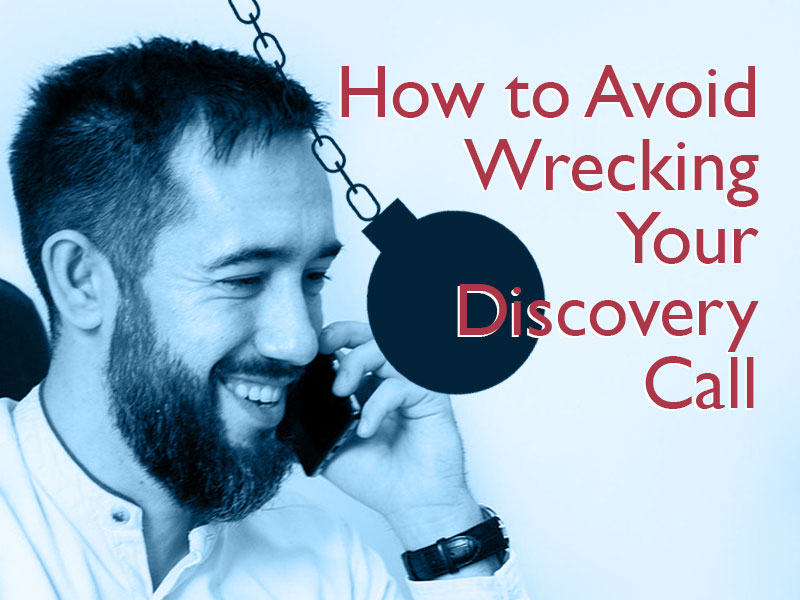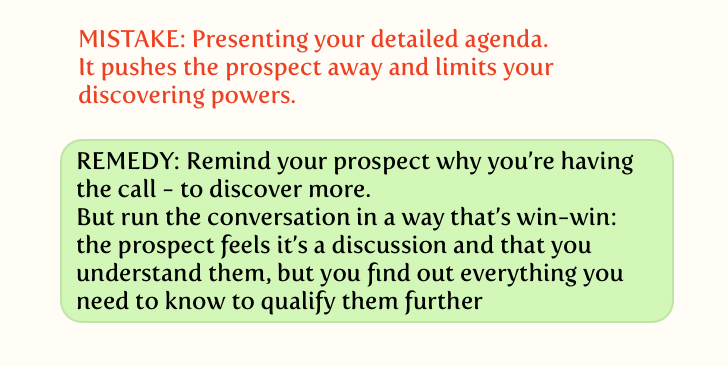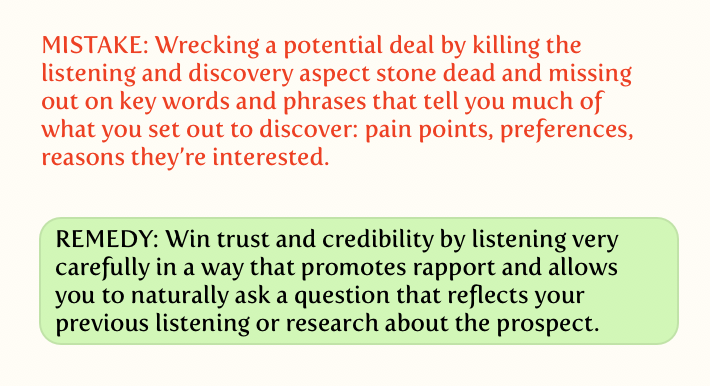
You’ve probably provided your reps with a super-detailed list of discovery call questions in your Sales Playbook – and that’s good. What’s not so good is finding your staff sometimes conduct a discovery call in a way that wrecks it!
So today we’ll look at that all-important call in a different way:
- What not to DO
- What not to SAY
- How not to LISTEN
That’s because you’re not pursuing a prospect yet, but qualifying them:
- A lead has been generated.
- You’ve had an introductory conversation to check things out and locate the right person in the prospect’s business.
- And now, this is the second stage in the process where you want to discover or find out new things to help you meet their needs – or end the association if they don’t suit your ideal customer profile.
A list of discovery questions isn’t therefore enough on its own. How you conduct the conversation is crucial.
So let’s look at the discovery sales call conversation from a different angle.
The Discovery Call: What NOT to Do
In a word? Don’t even think of sending over an advance agenda in the traditional way!
You’ll have one, sure. That list of questions! And you’ll need to remind them why you’re having the call – for you both to find out more.
But otherwise, why offer no overt agenda?
An example will help. If you say, “We’ll start with X, move on to Y, and cover A, B, and Z,” what message does that give? That you might bypass their input! The prospect will hear that you’re not so interested in them as they hoped you’d be.
Three more disadvantages to a traditional agenda.
1 Missing their ideas
You’ll miss their own ideas that they intended to put over and clarify when they agreed the call – but this is the pure gold dust you need to pan for!
It hints at what they’re after. It also helps you gear your questions more precisely so you steer the conversation in the right direction for this prospect and your business.
2 Ignoring detailed pain points
With a dictated agenda, you might also miss hearing a slightly different version of their pain points from what you gleaned earlier from the lead gen info and initial call.
3 Killing free conversation
An agenda can wreck important conversation that tells you their real values, buying intentions, and goals. Free conversation helps you assess the prospect’s value to your business.
You can then mentally match them up to your Unique Value Proposition – which leads to one of two actions:
- If positive, their values help you shape your proposal later, gearing it their specific needs. (In the discovery stage, you’re not interested in how many needs you could supply for Everyman Company, just this one prospect.)
- If negative, it’s a poor use of your time and money, and you cut and run (politely!) once you have sufficient information to make that assessment.
The Discovery Call: What NOT to Say
In a word? Don’t even think of saying anything that proves you’re not an experienced and empathetic sales person who’s done it before and knows what’s important!
This means you’ll avoid two wrecking balls in your sales discovery call:
- You won’t generalize
- You won’t ask stupid questions
Let’s take them in turn.
Don’t generalize
It’s unwise to say things like “Many firms have found…” or “Most staff benefit from the…” That’s alienating – you want the prospect to know you’re focused on them, not others.
On the other hand (as a brief diversion to the positive side), you could say something like, “In working with our clients who are similar to you, we’ve found they experience… Does this apply to your business?” But only for a very typical problem you’ve seen frequently!
Don’t ask stupid questions
1 Steer clear of simple questions that are easily answerable from their website. They waste the prospect’s time.
2 Be careful not to ask something you should have remembered from the sign-up lead-gen form or the initial brief call that are now filed in your CRM. This might include their specific reason for contacting you, what freebie they downloaded, or how they heard of you.
3 Avoid asking something that proves you weren’t fully listening. That’s not the same as saying, “You said X earlier, and I wonder if…” – which is a good way of clarifying things.
The Discovery Call: How NOT to Listen
In a word? Don’t even think of talking a lot to sound super competent!
The over-talking habit means you’re under-listening – which can limit the success of your discovery call. Worse, not listening properly may wreck a future relationship when you find crucial information is missing.
We’ll look at three specific examples of not listening properly (43:57 is the recommended ratio of talking to listening!).
1 Interrupting
If you interrupt to finish their sentences (don’t we all in normal conversation!), you miss their “voice” and word choice!
Then, as you ask the essential questions on your list, you’ll not be speaking their language. Further down the funnel, you’ll need to communicate their way, not as an alien.
Example: If you interrupt when you ask how they’d describe the challenges they’re facing, you miss their exact word choices.
This is important because it’s a powerful way of reflecting accurately what you heard so they feel understood and can trust you.
2 Assuming you understand
Assuming without asking clarifying questions implies you’re the expert in the prospect’s business and why they’re interested in your product or service – danger point.
Why?
The prospect may well know more or less about your product or service than you realize, and leaping at a random “awareness position” is risky to progress in the discovery call.
So – don’t assume anything. “Position” them carefully by listening well, so the information serves you well in any further funnel activities.
3 Pushing to prove a benefit
Example: “You’ll find two features of X really useful for sorting out Y. Let me show you this demo video.”
The discovery call is to collect information. Rushing ahead wrecks it. That’s because talking to sound clever or competent – rather than listening carefully – leads you into two dangers:
- Pushing feature after feature to prove a benefit (rather than exploring their challenges) – whether or not it’s appropriate to that prospect.
- Offering a demo before time. That comes later in the funnel.
Admittedly, it takes skill to listen actively with intention, but once acquired, it’s the backbone for that list of questions.
We Can Ensure Your Discovery Calls Thrive
The above are three ways not do things in a discovery call! However, if you’d like to read more, we address the basics of discovery calls here.
Moreover, at 360 Consulting, sales is our passion. We’d love to help you eliminate any mistakes your reps may be making. Contact us today for a free consultation. Let’s talk.



